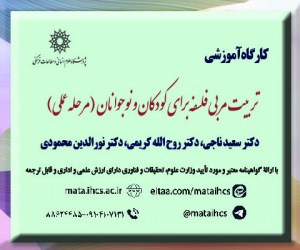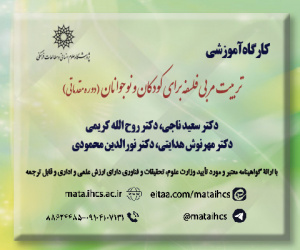بررسی تأثیرپذیری تفسیرهای آیات فردوس المرشدیه (با تکیه بر تاریخ طبری و تفسیر خواجه عبدالله انصاری) (مقاله علمی وزارت علوم)
درجه علمی: نشریه علمی (وزارت علوم)
آرشیو
چکیده
اثر ادبی در زمان و مکانی به رشته تحریر درمی آید که در ارتباط مستقیم با آثار قبلی است؛ درنتیجه هیچ نوشته ای از متون پیش از خود بی تأثیر نیست. در این پژوهش با هدف بررسی میزان تأثیرپذیری فردوس المرشدیه از تاریخ طبری و تفسیر خواجه عبدالله انصاری ، به روش توصیفی تطبیقی، شیوه های تأثیرپذیری بین این آثار بررسی می شود. نتیجه حاصل از این پژوهش نشان می دهد که شیخ ابواسحاق کازرونی تا چه اندازه از منابع کهن و تفسیرهای عرفانی وام گرفته و به چه نسبت مطالب و مضامین جدیدی بر متن ها و اندیشه های قبلی افزوده است. مطالعه فردوس المرشدیه نشان می دهد که تاریخ طبری و تفسیر خواجه عبدالله انصاری از منابع مطالعاتی شیخ ابواسحاق کازرونی و مریدان او بوده است. بررسی تطبیقی فردوس المرشدیه با تاریخ طبری گواه تأثیرپذیری مستقیم بدون ارجاع این اثر عرفانی در مبحث آفرینش و خلافت آدم (ع) از مباحث طبری است. همچنین تفسیرهای عرفانی شیخ بر آیات نیز از وجود تأثیرپذیری غیرمستقیم در مضامین آن با تفسیر خواجه عبدالله انصاری حکایت دارد؛ نیز سخنان و دیدگاه عارفان دیگر هم در ادامه شیوه تفسیری این کتاب به پیروی از خواجه عبدالله انصاری است؛ این تأثیرپذیری مستقیم در سطح عبارات و واژگان، در بیشتر اوقات به صورت نقل قول بدون ارجاع در متن شواهدی دارد.The Influence of Exegesis of Ferdows al-Murshediyeh's Verses by Relying on Tabari History and Exegesis of KhajehAbdollah Ansari
Literary worksarewritten in a time and place that aredirectly related to previous works; therefore, thewritings of the texts before themarenot ineffective. In this study, with the aim of investigating the influence of Ferdows al-Murshediyeh from Tabari’s history and KhajehAbdollah Ansari’sinterpretation, a descriptive-comparative methodwasused. The results of this study showedthe extent to which Sheikh Abu IshaqKazerouni borrowed from ancient sources and mystical interpretations and added to the previous texts and thoughts in relation to the new materials and themes.Ferdows al-Murshediyeh's study showed that Tabari’s history and exegesis of KhajehAbdollah Ansari were among the study sources of Sheikh Abu IshaqKazerouni and his disciples. Ferdows al-Murshediyeh's comparative study of Tabari’s history is evidence of a direct influence without referring to this mystical work in the field of creation and caliphate of Adam (AS) adopted from Tabari’s discussions. Also, the Sheikh’s mystical exegesis on the verses indicated the existence of an indirect influence of KhajehAbdollah Ansari’sinterpretation on its themes. In addition, the other mystics’views werein continuation of the exegetical method of this book based on KhajehAbdollah Ansari, which hada direct influence on the levels of phrases and vocabulary in most cases as quotations without a reference in the text. Keywords: Ferdows al-Murshediyeh, Sheikh Abu IshaqKazerouni, Exegesis of KhajehAbdollah Ansari, History of Tabari Introduction Throughout history, texts have been created in close relationship with each other in such a way that the previous texts have beenthe basis for the emergence and creation of subsequent texts, whichhavenot been created independently without the need for their own backgrounds. On the other hand, the textsources of Islamic mysticism, such as Quran and Hadith, have made the inevitable influences of mystical texts oneach other. These influences have beentakenby the intellectual space and common cultural elements, resulting in the same minds, approximations, and words. In the meantime, mystical memoirs are among the ancient works, whose themes have interacted with their earlier and future texts.Finding this interaction and relationship between the texts requires theircomparative reading. Materials & Methods The study of the functions of mystical verses and Sheikh Abu IshaqKazerouni’sinterpretations indicatedtheirinfluence on interpreting Qur'anic verses from old sources, such as Tabari’s history and KhajehAbdollah Ansari’s interpretation of the Qur'an. In this descriptive-comparative study, we soughtto answer these questions: 1) What is the influence of Ferdows al-Murshediyeh on the versesin terms of historical sources and mystical interpretations? 2) What are the methods of Ferdows al-Murshediyeh's influence in relation toTabari’s history and KhajehAbdollah Ansari’sinterpretation? It should be noted that the basis of this research in relation to KhajehAbdollah Ansari's interpretation of the Holy Qur'an was a book called "Exegesis of KhajehAbdollah Ansari" written by HabibollahAmouzgar, which was in fact the third time of the mystical exegesis of Meybudi in Kashf al-Asrar. Discussion of Results & Conclusions Literary texts share their earlier texts because of their clear and hidden quotes and influences. Sometimes, this influence is formed in the depths of concepts and themes and sometimes, borrowing and effectiveness can be retrieved at the vocabulary level. Whenever an element appears in the second text adopted from a literary or artistic text, it is certain that the second text is directly or indirectly influenced by the first text. The study of the influence of exegesis of Sheikh Abu IshaqKazerouni's verses on Ferdows al-Murshediyeh showed that Tabari's history and KhajehAbdollah Ansari’sinterpretation wereamong the main subtexts, on which Sheikh Kazerouni influenced based on his interpretive method on the verses. Sheikh Abu Ishaq was directly influenced by the concepts of Tabari’s history in the subjects of the story of creation and caliphate of Adam (AS), the age of Adam's demise, the creation of Eve, and the covering of Adam and Eve. It should be noted that this effect was reflected in its most explicit form as quotations without a reference. On the other hand, the reflection of KhajehAbdollah's insights and beliefs in Sheikh Abu IshaqKazerouni’sinterpretations showedan indirect influence. Since narration in meaning and content fell into the category of an indirect influence in Ferdows al-Murshediyeh, the themes of KhajehAbdollah Ansari's exegesis in the exegesis of Sheikh Abu IshaqKazerouni werenarrated in the form of meaning and content of objectivity. Sheikh abuIshaq was sometimes completely influenced by KhajehAbdollah’sinterpretationand sometimes brought his attitude in the section of the elders’sayings without mentioning his name. In some verses, Ansari's view encompassed only a small part of the exegesis of a verse and in some cases, the sheikh offered a different interpretation of the verse and the exegesis of KhajehAbdollah was expressed under the exegesis of Sheikh kazerouni when quoting the elders’sayings. In addition to the indirect influence, Khajeh Ansari's interpretations wererepeated in Ferdows al-Murshediyeh with a minor difference in terms of vocabularyand this influence clearly indicateda direct influence.



